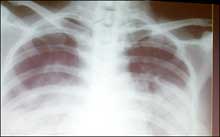|
Sino-EU project finds anti-SARS medicine
(Xinhua)
Updated: 2005-06-19 20:40
A medicine currently used to treat schizophrenia was found to be effective in inhibiting the coronavirus of the deadly Severe Acute Respiratory Syndrome (SARS), announced a group of Chinese and European scientists in Hangzhou, capital of east China's Zhejiang Province, on Sunday.

This undated file photo shows a chest X-ray of a SARS victim. Scientists conducting research in eastern China have found that a medicine used to treat schizophrenia is effective in treating patients with the deadly SARS disease. [AFP] |
Cinanserin, being in therapeutic usage against the mental disease since the 1970s, was identified as a cure for the SARS epidemic and is the only ready-to-use medicine among the total 15 possible anti-SARS remedies recommended by scientists participating in the Sino-European Project on SARS Diagnostics and Antivirals (SEPSDA) after careful pathological studies.
"The finding means that cinanserin could be directly prescribed to prevent the SARS disease or treat SARS patients if the fatal epidemic mounts a comeback," said Prof. Peter Kristensen, from Denmark's University of Aarhus.
The 14 other medicinal solutions have to go through lengthy animal tests before being used to treat human patients, said Kristensen, a participant of the three-year SEPSDA program, which was funded by the European Union and involved eight Chinese and European institutions.
The ambitious program, launched in 2004, aims to find 50 chemical compounds to treat SARS. In the coming two years, scientists from China, Germany, Poland and Denmark will continue to search for the rest 35 compounds, according to sources with the program.
In addition, scientists working for the program also confirmed on Sunday the finding of two homologous SARS coronaviruses inanimals from the Netherlands and Hong Kong, China respectively.
Prof. Rolf Hilgenfeld, from Germany's University of Luebeck, said that both the newly-found viruses and the formerly-detected SARS virus were variations of an ancient virus, which had been harbored among animals for ages but remained unidentified.
The German scholar also said other latent coronaviruses could pose dangers to human beings as the SARS virus did. "People should closely monitor such viruses and their variations to effectively prevent them from endangering humans," said Hilgenfeld.
|